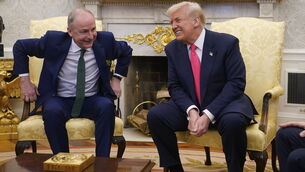Terry Prone: Was reverence for Fr Peter McVerry enough to turn blind eye to trust?

The trust set up in Father Peter McVerry’s name has required a €15m state bailout having been revealed to have suffered — in Matt Cooper’s words — ‘major failures of corporate governance’. File Picture: PA
The first description I ever heard of Fr Peter McVerry was one word divided into two for emphasis.
He was, a government minister told me, “IM-possible”. The first syllable uttered on a risen cadence, the second set of syllables accompanied by a headshake, often with closed eyes, as if opened eyes would cause the minister to see even more difficulties posed by the Jesuit.












